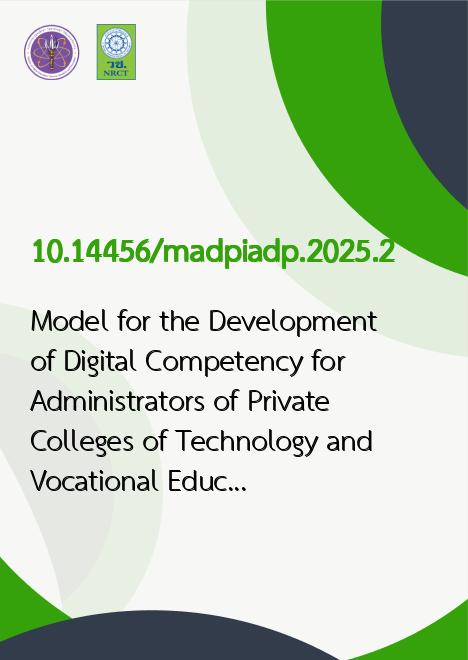
|
Model for the Development of Digital Competency for Administrators of Private Colleges of Technology and Vocational Education |
|---|---|
| รหัสดีโอไอ | |
| Creator | Pirul Pattanavongthai |
| Title | Model for the Development of Digital Competency for Administrators of Private Colleges of Technology and Vocational Education |
| Contributor | Usa Ngammeesri, Phumphakhawat Phumphongkhochasorn |
| Publisher | DR.KET Institute of Academic Development and Promotion |
| Publication Year | 2568 |
| Journal Title | Modern Academic Development and Promotion Journal |
| Journal Vol. | 3 |
| Journal No. | 1 |
| Page no. | 17-38 |
| Keyword | Development Model, Digital Technology Competency, Vocational School Administrators |
| URL Website | https://so12.tci-thaijo.org/index.php/MADPIADP/ |
| Website title | https://so12.tci-thaijo.org/index.php/MADPIADP/ |
| ISSN | 2822-1095 |
| Abstract | The objectives of this research study are to examine the current situation, needs, and development approaches for the digital technology competencies of private vocational school administrators. To validate the model for developing digital technology competencies. To evaluate the model for developing digital technology competencies. The sample group consists of 207 administrators from private vocational schools under the Office of the Vocational Education Commission (OVEC), covering 207 institutions in total. The data collection tools include in-depth interviews, focus group discussion records, and questionnaires for assessing the digital technology competency development model. Data analysis was conducted using mean and standard deviation.The findings of this study propose approaches for enhancing digital technology competence in private vocational education administrators, emphasizing adaptation in the digital age through hands-on training, the selection of appropriate tools, and the creation of learning communities. It also focuses on developing digital literacy for safe technology usage and training in digital tools for managing various tasks. Furthermore, the study highlights the development of problem-solving skills using digital tools and the adaptation to digital transformation through digital strategies. It supports resource allocation and building collaborative networks with external agencies to sustainably develop organizations.The assessment of the digital technology competency model for administrators of private vocational education institutions found that it is highly accurate, appropriate, feasible, and beneficial. This is because it was developed through a systematic process, utilizing expert input and academic principles. The findings align with research indicating that the use of information technology for learning at the secondary education level ranges from moderate to high. Additionally, key factors influencing the integration of technology in primary education include administrative support, technological pressure, and professional development. |